Reuters: Hezbollah leader Hassan Nasrallah alive after Israeli airstrikes
By Fidel Rahmati
- September 28, 2024

Following a heavy airstrike by Israeli warplanes on Hezbollah’s headquarters in the suburbs of Beirut, Reuters, citing a source close to Hezbollah, reported that Hassan Nasrallah, the group’s Secretary-General, is alive.
Israeli media reported that the target of the Israeli airstrike in southern Beirut was Hezbollah’s Secretary-General.
The Israeli army announced on Friday that it had attacked Hezbollah’s main headquarters in southern Lebanon.
Fox News, quoting Israeli sources, confirmed that the target of the Israeli airstrike on Hezbollah’s command center was Hassan Nasrallah.
Al-Arabiya reported that Israel bombed the Dahiyeh area in the southern suburbs of Beirut, with at least ten strikes carried out in the area within minutes.
A Hezbollah official stated that six buildings were completely destroyed in the Israeli airstrike.
Daniel Hagari, the Israeli army spokesperson, said in a televised statement that Hezbollah’s central command is located deep within civilian areas.
Security sources in Lebanon confirmed that the attack targeted an area usually occupied by senior Hezbollah officials.
Reuters reported that this was the heaviest attack in Beirut during the year-long conflict between Hezbollah and Israel.
Tasnim News Agency, affiliated with Iran’s Islamic Revolutionary Guard Corps, cited security sources reporting that “Hassan Nasrallah is in a safe location.”
This attack coincided with Israeli Prime Minister Benjamin Netanyahu’s speech at the United Nations General Assembly.
Netanyahu referred to Hezbollah as “the essence of global terrorist organizations” and added, “We will continue to weaken Hezbollah until we achieve our goal. We are committed to eliminating the curse of terrorism that affects the entire world.”
The IDF has confirmed that they have killed the Hezbollah chief in airstrikes
Published: September 28, 2024
An image grab taken from Hezbollah's Al Manar TV shows the Lebanese militant group's chief Hassan Nasrallah.Image Credit: AFP
Dubai: The Israel Defense Forces (IDF) has reportedly confirmed they have killed Hezbollah leader Hassan Nasrallah in airstrikes that targeted Southern Suburbs of Beirut last night.
"Hassan Nasrallah is dead," military spokesman Lieutenant Colonel Nadav Shoshani announced on X. Military spokesman Captain David Avraham also confirmed to AFP that the Hezbollah chief had been "eliminated" following strikes Friday on the Lebanese capital.
Contact lost
A source close to Lebanon's Hezbollah group said Saturday contact had been lost since last evening with chief Hassan Nasrallah, after Israel said it had "eliminated" him in a strike on the group's southern Beirut bastion.
"Contact with Sayyed Hassan Nasrallah has been lost since Friday evening," said the source, requesting anonymity to discuss sensitive matters. He did not confirm whether Nasrallah had been killed.
Ali Karki also killed
The strikes, carried out late Friday night, also reportedly killed senior Hezbollah commander Ali Karki, alongside other key figures in the group.
The confirmation followed initial reports from Israeli media that Israel’s security services had conclusive proof of Nasrallah’s death during a major assassination operation.
How it happened
The airstrikes targeted Hezbollah’s central military headquarters, located in a heavily fortified underground facility beneath a residential building in the Dahieh district of Beirut, a stronghold of the militant group.
The IDF's statement noted that the attack was based on intelligence from Israel's Mossad and was launched while Hezbollah’s leadership was inside the headquarters coordinating operations.
Nasrallah, who led Hezbollah for 32 years, was the principal architect behind the group’s military and terrorist activities, which included attacks on Israeli civilians and soldiers, as well as operations abroad.
Dubai: The Israel Defense Forces (IDF) has reportedly confirmed they have killed Hezbollah leader Hassan Nasrallah in airstrikes that targeted Southern Suburbs of Beirut last night.
"Hassan Nasrallah is dead," military spokesman Lieutenant Colonel Nadav Shoshani announced on X. Military spokesman Captain David Avraham also confirmed to AFP that the Hezbollah chief had been "eliminated" following strikes Friday on the Lebanese capital.
Contact lost
A source close to Lebanon's Hezbollah group said Saturday contact had been lost since last evening with chief Hassan Nasrallah, after Israel said it had "eliminated" him in a strike on the group's southern Beirut bastion.
"Contact with Sayyed Hassan Nasrallah has been lost since Friday evening," said the source, requesting anonymity to discuss sensitive matters. He did not confirm whether Nasrallah had been killed.
Ali Karki also killed
The strikes, carried out late Friday night, also reportedly killed senior Hezbollah commander Ali Karki, alongside other key figures in the group.
The confirmation followed initial reports from Israeli media that Israel’s security services had conclusive proof of Nasrallah’s death during a major assassination operation.
How it happened
The airstrikes targeted Hezbollah’s central military headquarters, located in a heavily fortified underground facility beneath a residential building in the Dahieh district of Beirut, a stronghold of the militant group.
The IDF's statement noted that the attack was based on intelligence from Israel's Mossad and was launched while Hezbollah’s leadership was inside the headquarters coordinating operations.
Nasrallah, who led Hezbollah for 32 years, was the principal architect behind the group’s military and terrorist activities, which included attacks on Israeli civilians and soldiers, as well as operations abroad.
Nasrallah, a 64-year-old Shiite cleric, took control of Hezbollah in 1992 after his predecessor, Abbas Al Musawi, was assassinated by Israeli forces.
Under Nasrallah’s leadership, Hezbollah became not only a dominant political party in Lebanon but also an entity with a robust military presence, wielding significant influence across the region.
Nasrallah’s tenure included leading the fight against Israel’s occupation of southern Lebanon, ultimately forcing Israeli forces to withdraw in 2000 without a peace treaty.
The airstrikes and subsequent confirmation of Nasrallah’s death come amid heightened tensions between Israel and Hezbollah, as well as growing concerns about the potential for broader conflict in the region.
The IDF emphasized that Nasrallah, throughout his leadership, was directly responsible for orchestrating thousands of terrorist acts and the deaths of countless Israeli civilians and soldiers.
Strikes continue
The Israeli military said it struck dozens of Hezbollah targets on Saturday in eastern and southern Lebanon, as the Lebanese armed group fired rockets into northern Israel.
Saturday morning's wave of Israeli strikes followed intense overnight bombardment targeting Hezbollah's southern Beirut stronghold, the site of a massive Israeli attack on Friday that flattened several residential buildings.
"The IAF (air force) conducted extensive strikes on dozens of terror targets belonging to the Hezbollah terrorist organisation in the area of Beqaa (east) and in different areas of southern Lebanon," the military said in a statement.
Air raid sirens sounded across northern Israel early on Saturday, warning of a barrage of rockets being fired from across the border.
Israel takes on Iran by neutralising Hassan Nasrallah
By Shishir Gupta
Sep 28, 2024 03:40 PM IST
That the Israelis caught Nasrallah unawares in his Beirut bunker last night shows the level of precise actionable intelligence and deadly targeting
The targeted assassination of Hezbollah’s terrorist in-chief Hassan Nasrallah by Israeli Air Force after neutralising top Radwan force commanders, pager explosions and walkie-talkie explosions within the Iran-backed Shia groups shows deep penetration of Israeli agencies inside the Lebanon-based Islamist group.
By Shishir Gupta
Sep 28, 2024 03:40 PM IST
That the Israelis caught Nasrallah unawares in his Beirut bunker last night shows the level of precise actionable intelligence and deadly targeting
The targeted assassination of Hezbollah’s terrorist in-chief Hassan Nasrallah by Israeli Air Force after neutralising top Radwan force commanders, pager explosions and walkie-talkie explosions within the Iran-backed Shia groups shows deep penetration of Israeli agencies inside the Lebanon-based Islamist group.

Iranian leader Al Khamenei with killed Hezbollah's Hassan Nasrallah and assassinated IRGC head Qassem Suleimani
Sixty-four-year-old Nasrallah was the principal cat’s paw of Ayatollahs of Iran as he ran the brutal Islamic group for the past three decades, taking on the powerful Israelis head-on during the occupation of southern Lebanon and then 2006 land war which ended in a stalemate.
Sixty-four-year-old Nasrallah was the principal cat’s paw of Ayatollahs of Iran as he ran the brutal Islamic group for the past three decades, taking on the powerful Israelis head-on during the occupation of southern Lebanon and then 2006 land war which ended in a stalemate.
That the Israelis caught Nasrallah unawares in his Beirut bunker last night shows the level of precise actionable intelligence and deadly targeting through laser-guided concrete penetrating bombs by the Israeli Air Force.
Presently, the majority of the population in north and central Israel are hiding in bomb shelters fearing Hezbollah and Iran retaliation post-killing of Nasrallah.
Hassan Nasrullah was favourite of Ayatollah Khamenei
Although Iran has been using Shia Houthis, Sunni Hamas, and Shia Kaitab Hezbollah in Iraq, Nasrallah, and his Lebanon-based group is the closest to the Iranian clergy and its strong arm—the QUDS force.
The killing of Nasrallah along with the deaths of senior commanders since the pagers exploded must be a serious setback for Tehran as the son of a vegetable seller was a favourite of Ayatollah Khomeini.
It was Khomeini’s 1979 Iranian revolution that radicalized the Hezbollah cadre and made them into fighters after taking training from Islamic Revolutionary Guard Corps of Iran. Hezbollah supported Syrian dictator Bashar al-Assad and virtually captured the once-Christian Lebanon.
Nasrallah ran afoul with Israel after Hezbollah launched rocket attacks into the north of Jew nation in support of Hamas post-October 7 massacre. In a span of two months, Israel has severely degraded Hezbollah’s fighting capabilities after killing top commanders like Fuad Shukr and Ibrahim Aqil in targeted strikes.
The losses of top and middle-level Hezbollah commanders will make it very difficult for Iran to appoint the successor of Nasrallah as even his deputy has been taken out by Tel Aviv.
Just like Hamas, Hezbollah is an ideology that cannot die despite its top leader being exterminated. The Israeli borders with Lebanon and Gaza will remain hot and so will be the skies with missiles being fired by Houthis in Yemen. The death of Nasrallah may trigger a strong retaliation from Iran but the missile capabilities of Tehran are limited in range and effectiveness.
After taking out Hamas’ Ismail Haniyeh in Tehran, Nasrallah in Lebanon, Israel has taken the fight to Iran. The ball is now in Ali Khamenei’s court as his credibility is at stake.
Presently, the majority of the population in north and central Israel are hiding in bomb shelters fearing Hezbollah and Iran retaliation post-killing of Nasrallah.
Hassan Nasrullah was favourite of Ayatollah Khamenei
Although Iran has been using Shia Houthis, Sunni Hamas, and Shia Kaitab Hezbollah in Iraq, Nasrallah, and his Lebanon-based group is the closest to the Iranian clergy and its strong arm—the QUDS force.
The killing of Nasrallah along with the deaths of senior commanders since the pagers exploded must be a serious setback for Tehran as the son of a vegetable seller was a favourite of Ayatollah Khomeini.
It was Khomeini’s 1979 Iranian revolution that radicalized the Hezbollah cadre and made them into fighters after taking training from Islamic Revolutionary Guard Corps of Iran. Hezbollah supported Syrian dictator Bashar al-Assad and virtually captured the once-Christian Lebanon.
Nasrallah ran afoul with Israel after Hezbollah launched rocket attacks into the north of Jew nation in support of Hamas post-October 7 massacre. In a span of two months, Israel has severely degraded Hezbollah’s fighting capabilities after killing top commanders like Fuad Shukr and Ibrahim Aqil in targeted strikes.
The losses of top and middle-level Hezbollah commanders will make it very difficult for Iran to appoint the successor of Nasrallah as even his deputy has been taken out by Tel Aviv.
Just like Hamas, Hezbollah is an ideology that cannot die despite its top leader being exterminated. The Israeli borders with Lebanon and Gaza will remain hot and so will be the skies with missiles being fired by Houthis in Yemen. The death of Nasrallah may trigger a strong retaliation from Iran but the missile capabilities of Tehran are limited in range and effectiveness.
After taking out Hamas’ Ismail Haniyeh in Tehran, Nasrallah in Lebanon, Israel has taken the fight to Iran. The ball is now in Ali Khamenei’s court as his credibility is at stake.
Iran Supreme Leader next? Tehran moves Ayatollah Khamenei to secure spot after IDF says Hezbollah chief killed
After declaring Hezbollah chief Hassan Nasrallah dead, Israeli army chief said, 'Anyone who threatens the citizens of Israel – we will know how to reach them'
Web Desk Updated: September 28, 2024 15:21 IST
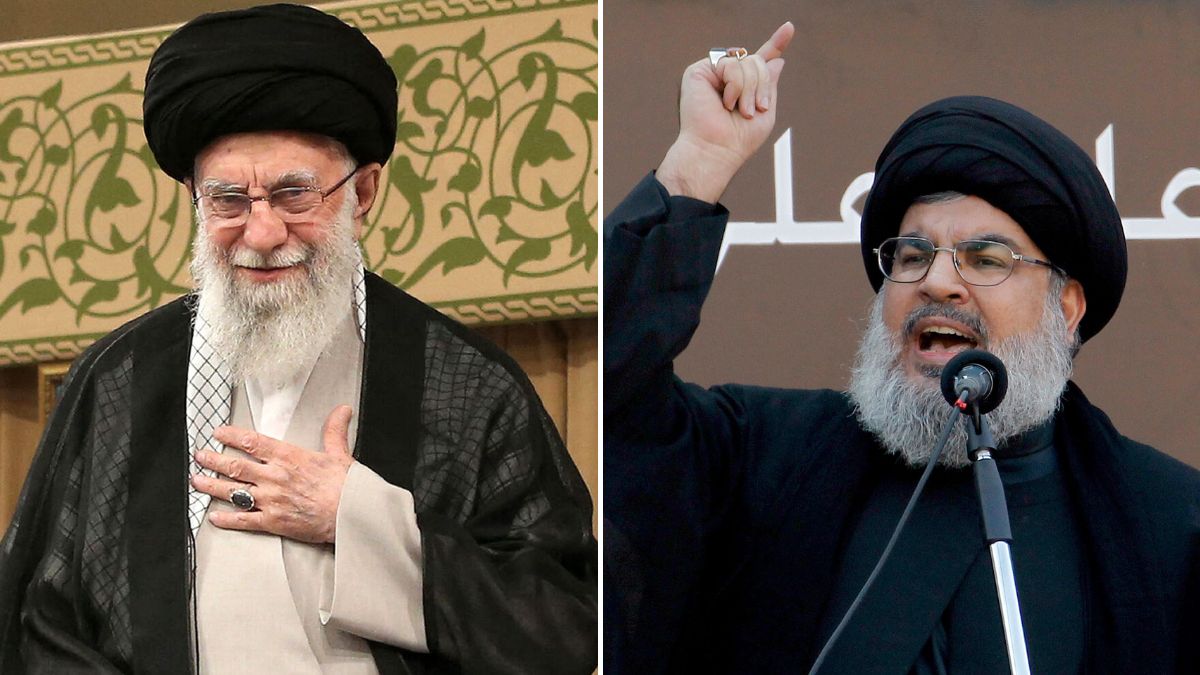
After declaring Hezbollah chief Hassan Nasrallah dead, Israeli army chief said, 'Anyone who threatens the citizens of Israel – we will know how to reach them'
Web Desk Updated: September 28, 2024 15:21 IST

Iran's Supreme Leader Ayatollah Ali Khamenei was moved to a secure location after Israel announced the death of Hezbollah chief Hassan Nasrallah | AFP
Iran Supreme Leader Ayatollah Ali Khamenei has been moved to safer place within the country and security has been beefed up after Israeli military said Tehran-backed Hezbollah chief Hassan Nasrallah was killed in the Beirut strike, said a report.
The sources quoted by Reuters said Iran was in constant touch with Hezbollah to decide on its next move.
ALSO READ: Hezbollah chief Hassan Nasrallah DEAD in Beirut strike, claims IDF
Iran Supreme Leader Ayatollah Ali Khamenei has been moved to safer place within the country and security has been beefed up after Israeli military said Tehran-backed Hezbollah chief Hassan Nasrallah was killed in the Beirut strike, said a report.
The sources quoted by Reuters said Iran was in constant touch with Hezbollah to decide on its next move.
ALSO READ: Hezbollah chief Hassan Nasrallah DEAD in Beirut strike, claims IDF
Iran's move comes after Israeli army chief said the IDF has not emptied its "toolbox" with Nasrallah's assassination. Chief of the General Staff Herzi Halevi said "the message is simple: Anyone who threatens the citizens of Israel – we will know how to reach them."
Hezbollah leadership was meeting at their undrground headquarters in south Beirut when the Israeli military launched its precision attack.
Hezbollah is yet confirm if Nasrallah has been killed. Earlier, a spokesperson of the group said the Hezbollah chief was fine and not in the targeted location.
Reports also said Nasrallah's daughter Zainab Nasrallah, Hezbollah missile unit commander Muhammad Ali Ismail and his deputy Hossein Ahmed Ismail were also killed in IDF strikes.
Israel had activated three batallions of reserve soldiers amid recent attacks in Lebanon.
Hezbollah leadership was meeting at their undrground headquarters in south Beirut when the Israeli military launched its precision attack.
Hezbollah is yet confirm if Nasrallah has been killed. Earlier, a spokesperson of the group said the Hezbollah chief was fine and not in the targeted location.
Reports also said Nasrallah's daughter Zainab Nasrallah, Hezbollah missile unit commander Muhammad Ali Ismail and his deputy Hossein Ahmed Ismail were also killed in IDF strikes.
Israel had activated three batallions of reserve soldiers amid recent attacks in Lebanon.
ANALYSIS
Strikes on Beirut’s southern suburbs, the fate of Nasrallah: how to explain Hezbollah’s silence
The party's media continues its coverage of the war as if nothing has happened.
OLJ / By Salah HIJAZI, 28 September 2024
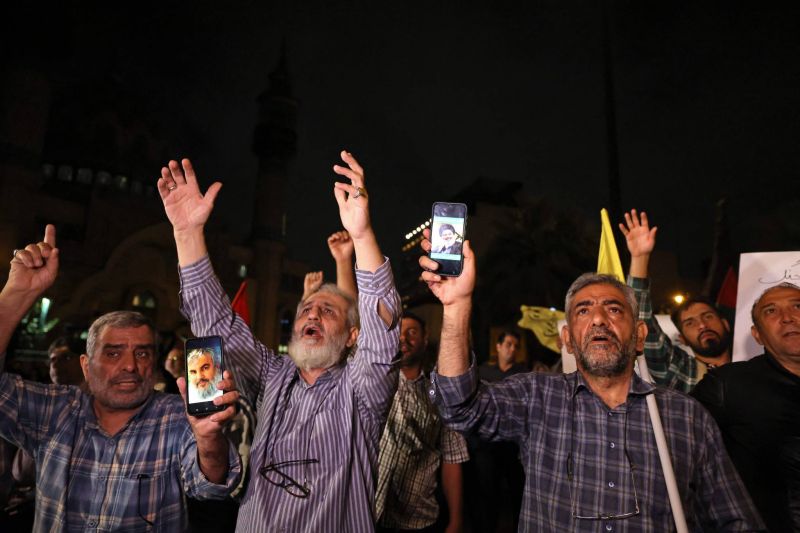
Protesters in Tehran hold up photos of Hezbollah leader Hassan Nasrallah following the Israeli strike on the southern suburbs on Friday, September 27, 2024. Photo credit: ATTA KENARE / AFP
The Israeli army announced on Saturday that it had succeeded in assassinating, in a lethal strike on the southern suburbs of Beirut the day before, the all-powerful secretary-general of Hezbollah, Hassan Nasrallah. An event whose shockwaves are likely to be felt across the region, as Nasrallah was a key figure in the pro-Iranian axis. He is sometimes even described as the number two in this camp, behind Supreme Leader Ali Khamenei.
During the night from Friday to Saturday, the southern suburb, a Hezbollah stronghold and densely populated area, was bombarded throughout the night. But on Hezbollah’s side, it’s radio silence. The party's media,such as its al-Manar channel or the al-Ahed website, do not mention Israeli allegations about this assassination or the uncertainty about Hassan Nasrallah's fate.
On the contrary, these two outlets continue their coverage of the war as if nothing had happened. Similarly, the party's official communication channels simply announce the various operations it is conducting against Israel. A resounding silence that raises many questions.
What we know
After the violent Israeli strike on Friday against the southern suburbs of Beirut, which, according to Tel Aviv, targeted the party's headquarters, sources close to Hezbollah told Reuters that the organization had lost contact with its leader. At the same time, other party insiders, such as journalist Faisal Abdel Sater, claimed that Hassan Nasrallah was still alive. The next day, the Israelis announced they had evidence of the "success" of their operation, which Hezbollah has not commented on.
The hypotheses
Hezbollah's silence regarding the fate of its secretary-general could simply be due to the fact that the party itself does not know if Hassan Nasrallah has survived the strike or not. This is reminiscent of the assassination by Israel of the chief of staff of the organization, Fouad Chukur, last August. It took a day for his body to be found and his death confirmed. In the meantime, contradictory information was constantly circulating.
Hezbollah has all the more reason to refrain from making statements on the subject since Nasrallah has developed, over his years at the head of the powerful Shiite organization, an almost divine image in the eyes of his most loyal supporters. Announcing uncertainty about his fate, or even his death, could cause panic and mobilization in the streets, especially in Shiite regions that have been continuously bombarded by the Israeli army since Friday evening.
Another hypothesis that circulates, particularly in circles close to the organization, is that Hassan Nasrallah is still alive, and his silence is therefore a tool of "psychological warfare" against Israel. These circles particularly recall the July 2006 war, during which Hassan Nasrallah broke a three-day silence with a speech. He announced, live, a missile strike on an Israeli warship deployed in Lebanese waters. "Watch it burn," he exclaimed, in a speech forever etched in history.
A third hypothesis can be put forward: that the party is completely overwhelmed by events. If the death of its leader is confirmed, the entire command would have been decapitated. Hezbollah is probably awaiting instructions from its Iranian patron before reacting. But on Tehran's side too, there is radio silence.
Strikes on Beirut’s southern suburbs, the fate of Nasrallah: how to explain Hezbollah’s silence
The party's media continues its coverage of the war as if nothing has happened.
OLJ / By Salah HIJAZI, 28 September 2024

Protesters in Tehran hold up photos of Hezbollah leader Hassan Nasrallah following the Israeli strike on the southern suburbs on Friday, September 27, 2024. Photo credit: ATTA KENARE / AFP
The Israeli army announced on Saturday that it had succeeded in assassinating, in a lethal strike on the southern suburbs of Beirut the day before, the all-powerful secretary-general of Hezbollah, Hassan Nasrallah. An event whose shockwaves are likely to be felt across the region, as Nasrallah was a key figure in the pro-Iranian axis. He is sometimes even described as the number two in this camp, behind Supreme Leader Ali Khamenei.
During the night from Friday to Saturday, the southern suburb, a Hezbollah stronghold and densely populated area, was bombarded throughout the night. But on Hezbollah’s side, it’s radio silence. The party's media,such as its al-Manar channel or the al-Ahed website, do not mention Israeli allegations about this assassination or the uncertainty about Hassan Nasrallah's fate.
On the contrary, these two outlets continue their coverage of the war as if nothing had happened. Similarly, the party's official communication channels simply announce the various operations it is conducting against Israel. A resounding silence that raises many questions.
What we know
After the violent Israeli strike on Friday against the southern suburbs of Beirut, which, according to Tel Aviv, targeted the party's headquarters, sources close to Hezbollah told Reuters that the organization had lost contact with its leader. At the same time, other party insiders, such as journalist Faisal Abdel Sater, claimed that Hassan Nasrallah was still alive. The next day, the Israelis announced they had evidence of the "success" of their operation, which Hezbollah has not commented on.
The hypotheses
Hezbollah's silence regarding the fate of its secretary-general could simply be due to the fact that the party itself does not know if Hassan Nasrallah has survived the strike or not. This is reminiscent of the assassination by Israel of the chief of staff of the organization, Fouad Chukur, last August. It took a day for his body to be found and his death confirmed. In the meantime, contradictory information was constantly circulating.
Hezbollah has all the more reason to refrain from making statements on the subject since Nasrallah has developed, over his years at the head of the powerful Shiite organization, an almost divine image in the eyes of his most loyal supporters. Announcing uncertainty about his fate, or even his death, could cause panic and mobilization in the streets, especially in Shiite regions that have been continuously bombarded by the Israeli army since Friday evening.
Another hypothesis that circulates, particularly in circles close to the organization, is that Hassan Nasrallah is still alive, and his silence is therefore a tool of "psychological warfare" against Israel. These circles particularly recall the July 2006 war, during which Hassan Nasrallah broke a three-day silence with a speech. He announced, live, a missile strike on an Israeli warship deployed in Lebanese waters. "Watch it burn," he exclaimed, in a speech forever etched in history.
A third hypothesis can be put forward: that the party is completely overwhelmed by events. If the death of its leader is confirmed, the entire command would have been decapitated. Hezbollah is probably awaiting instructions from its Iranian patron before reacting. But on Tehran's side too, there is radio silence.
Nasrallah led Hezbollah through decades of conflict with Israel
Updated / Saturday, 28 Sep 2024
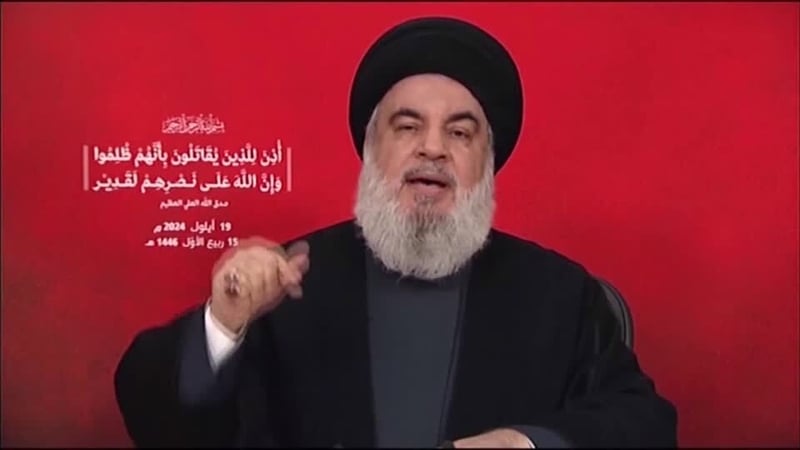
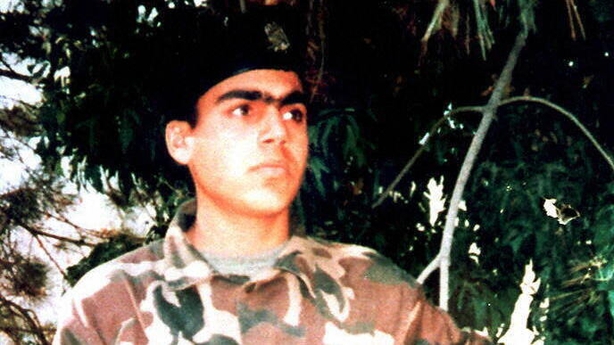
Updated / Saturday, 28 Sep 2024

Hassan Nasrallah's most recent speech broadcast on 19 September
Lebanon's Sayyed Hassan Nasrallah, who Israel said it has killed, led Hezbollah through decades of conflict with Israel, overseeing its transformation into a military force with regional sway and becoming one of the most prominent Arab figures in generations - with Iranian backing.
The Iran-backed Hezbollah has yet to issue any statement on the status of Nasrallah, who led the group for 32 years.
The Israeli military said it had killed Nasrallah in an airstrike on the group's central headquarters in the southern suburbs of Beirut a day earlier.
The Israeli military "eliminated ... Hassan Nasrallah, leader of the Hezbollah terrorist organisation," Israeli army spokesperson Avichay Adraee wrote in a statement on X.
Among supporters, Nasrallah was lauded for standing up to Israel and defying the United States.
To enemies, he was head of a terrorist organisation and a proxy for Iran's Shi'ite Islamist theocracy in its tussle for influence in the Middle East.
His regional influence was on display over nearly a year of conflict ignited by the Gaza war, as Hezbollah entered the fray by firing on Israel from southern Lebanon in support of its Palestinian ally Hamas, and Yemeni and Iraqi groups followed suit, operating under the umbrella of "The Axis of Resistance".
"We are facing a great battle," Nasrallah said in an 1 August speech at the funeral of Hezbollah's top military commander, Fuad Shukr, who was killed in an Israeli strike on the Hezbollah-controlled southern suburbs of Beirut.
Yet when thousands of Hezbollah members were injured and dozens killed, when their communications devices exploded in an apparent Israeli attack last week, that battle began to turn against his group.
Responding to the attacks on Hezbollah's communications network in a 19 September speech, Nasrallah vowed to punish Israel.
"This is a reckoning that will come, its nature, its size, how and where? This is certainly what we will keep to ourselves and in the narrowest circle even within ourselves," he said.
He had not given a broadcast address since then.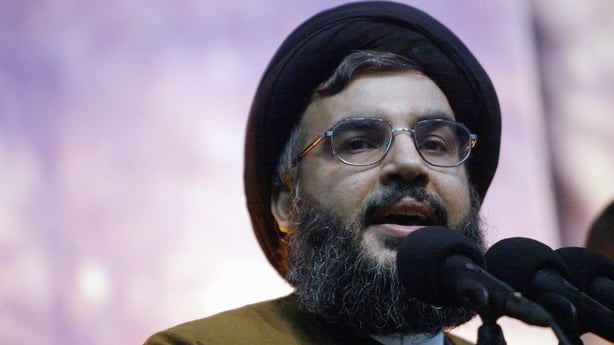
Hassan Nasrallah speaking in Beirut in 2004
Israel has meanwhile dramatically escalated its attacks, killing several senior Hezbollah commanders in targeted strikes and unleashing a massive bombardment in Hezbollah-controlled areas of Lebanon, which has killed hundreds of people.
Recognised even by his enemies as a skilled orator, Nasrallah's speeches were followed by friend and foe alike.
Wearing the black turban of a sayyed, or a descendent of the Prophet Mohammad, Nasrallah used his addresses to rally Hezbollah's base but also to deliver carefully calibrated threats, often wagging his finger as he does so.
He became secretary general of Hezbollah in 1992 aged just 35, the public face of a once shadowy group founded by Iran's Revolutionary Guards in 1982 to fight Israeli occupation forces.
Israel killed his predecessor, Sayyed Abbas al-Musawi, in a helicopter attack. Nasrallah led Hezbollah when its guerrillas finally drove Israeli forces from southern Lebanon in 2000, ending an 18-year occupation.
'Divine victory'
Conflict with Israel largely defined his leadership. He declared "Divine Victory" in 2006 after Hezbollah waged 34 days of war with Israel, winning the respect of many ordinary Arabs who had grown up watching Israel defeat their armies.
But he became an increasingly divisive figure in Lebanon and the wider Arab world as Hezbollah's area of operations widened to Syria and beyond, reflecting an intensifying conflict between Shi'ite Iran and US-allied Sunni Arab monarchies in the Gulf.
While Nasrallah painted Hezbollah's engagement in Syria - where it fought in support of President Bashar al-Assad during the civil war - as a campaign against jihadists, critics accused the group of becoming part of a regional sectarian conflict.
At home, Nasrallah's critics said Hezbollah's regional adventurism imposed an unbearable price on Lebanon, leading once friendly Gulf Arabs to shun the country - a factor that contributed to its 2019 financial collapse.
In the years following the 2006 war, Nasrallah walked a tightrope over a new conflict with Israel, hoarding Iranian rockets in a carefully measured contest of threat and counter threat.
The Gaza war, ignited by the 7 October Hamas attack on Israel, prompted Hezbollah's worst conflict with Israel since 2006, costing the group hundreds of its fighters including top commanders.
After years of entanglements elsewhere, the conflict put renewed focus on Hezbollah's historic struggle with Israel.
"We are here paying the price for our front of support for Gaza, and for the Palestinian people, and our adoption of the Palestinian cause," Nasrallah said in the 1 August speech.
Nasrallah grew up in Beirut's impoverished Karantina district. His family hail from Bazouriyeh, a village in the Lebanon's predominantly Shi'ite south which today forms Hezbollah's political heartland.
He was part of a generation of young Lebanese Shi'ites whose political outlook was shaped by Iran's 1979 Islamic Revolution.
Before leading the group, he used to spend nights with frontline guerrillas fighting Israel's occupying army. His teenage son, Hadi, died in battle in 1997, a loss that gave him legitimacy among his core Shi'ite constituency in Lebanon.
Lebanon's Sayyed Hassan Nasrallah, who Israel said it has killed, led Hezbollah through decades of conflict with Israel, overseeing its transformation into a military force with regional sway and becoming one of the most prominent Arab figures in generations - with Iranian backing.
The Iran-backed Hezbollah has yet to issue any statement on the status of Nasrallah, who led the group for 32 years.
The Israeli military said it had killed Nasrallah in an airstrike on the group's central headquarters in the southern suburbs of Beirut a day earlier.
The Israeli military "eliminated ... Hassan Nasrallah, leader of the Hezbollah terrorist organisation," Israeli army spokesperson Avichay Adraee wrote in a statement on X.
Among supporters, Nasrallah was lauded for standing up to Israel and defying the United States.
To enemies, he was head of a terrorist organisation and a proxy for Iran's Shi'ite Islamist theocracy in its tussle for influence in the Middle East.
His regional influence was on display over nearly a year of conflict ignited by the Gaza war, as Hezbollah entered the fray by firing on Israel from southern Lebanon in support of its Palestinian ally Hamas, and Yemeni and Iraqi groups followed suit, operating under the umbrella of "The Axis of Resistance".
"We are facing a great battle," Nasrallah said in an 1 August speech at the funeral of Hezbollah's top military commander, Fuad Shukr, who was killed in an Israeli strike on the Hezbollah-controlled southern suburbs of Beirut.
Yet when thousands of Hezbollah members were injured and dozens killed, when their communications devices exploded in an apparent Israeli attack last week, that battle began to turn against his group.
Responding to the attacks on Hezbollah's communications network in a 19 September speech, Nasrallah vowed to punish Israel.
"This is a reckoning that will come, its nature, its size, how and where? This is certainly what we will keep to ourselves and in the narrowest circle even within ourselves," he said.
He had not given a broadcast address since then.

Hassan Nasrallah speaking in Beirut in 2004
Israel has meanwhile dramatically escalated its attacks, killing several senior Hezbollah commanders in targeted strikes and unleashing a massive bombardment in Hezbollah-controlled areas of Lebanon, which has killed hundreds of people.
Recognised even by his enemies as a skilled orator, Nasrallah's speeches were followed by friend and foe alike.
Wearing the black turban of a sayyed, or a descendent of the Prophet Mohammad, Nasrallah used his addresses to rally Hezbollah's base but also to deliver carefully calibrated threats, often wagging his finger as he does so.
He became secretary general of Hezbollah in 1992 aged just 35, the public face of a once shadowy group founded by Iran's Revolutionary Guards in 1982 to fight Israeli occupation forces.
Israel killed his predecessor, Sayyed Abbas al-Musawi, in a helicopter attack. Nasrallah led Hezbollah when its guerrillas finally drove Israeli forces from southern Lebanon in 2000, ending an 18-year occupation.
'Divine victory'
Conflict with Israel largely defined his leadership. He declared "Divine Victory" in 2006 after Hezbollah waged 34 days of war with Israel, winning the respect of many ordinary Arabs who had grown up watching Israel defeat their armies.
But he became an increasingly divisive figure in Lebanon and the wider Arab world as Hezbollah's area of operations widened to Syria and beyond, reflecting an intensifying conflict between Shi'ite Iran and US-allied Sunni Arab monarchies in the Gulf.
While Nasrallah painted Hezbollah's engagement in Syria - where it fought in support of President Bashar al-Assad during the civil war - as a campaign against jihadists, critics accused the group of becoming part of a regional sectarian conflict.
At home, Nasrallah's critics said Hezbollah's regional adventurism imposed an unbearable price on Lebanon, leading once friendly Gulf Arabs to shun the country - a factor that contributed to its 2019 financial collapse.
In the years following the 2006 war, Nasrallah walked a tightrope over a new conflict with Israel, hoarding Iranian rockets in a carefully measured contest of threat and counter threat.
The Gaza war, ignited by the 7 October Hamas attack on Israel, prompted Hezbollah's worst conflict with Israel since 2006, costing the group hundreds of its fighters including top commanders.
After years of entanglements elsewhere, the conflict put renewed focus on Hezbollah's historic struggle with Israel.
"We are here paying the price for our front of support for Gaza, and for the Palestinian people, and our adoption of the Palestinian cause," Nasrallah said in the 1 August speech.
Nasrallah grew up in Beirut's impoverished Karantina district. His family hail from Bazouriyeh, a village in the Lebanon's predominantly Shi'ite south which today forms Hezbollah's political heartland.
He was part of a generation of young Lebanese Shi'ites whose political outlook was shaped by Iran's 1979 Islamic Revolution.
Before leading the group, he used to spend nights with frontline guerrillas fighting Israel's occupying army. His teenage son, Hadi, died in battle in 1997, a loss that gave him legitimacy among his core Shi'ite constituency in Lebanon.

Hassan Nasrallah's son Hadi was killed in battle in 1997
Powerful enemies
He had a track record of threatening powerful enemies.
As regional tensions escalated after the eruption of the Gaza war, Nasrallah issued a thinly veiled warning to US warships in the Mediterranean, telling them: "We have prepared for the fleets with which you threaten us."
In 2020, Nasrallah vowed that US soldiers would leave the region in coffins after Iranian general Qassem Soleimani was killed in a US drone strike in Iraq.
He expressed fierce opposition to Saudi Arabia over its armed intervention in Yemen, where, with US and other allied support, Riyadh sought to roll back the Iran-aligned Houthis.
As regional tensions rose in 2019 following an attack on Saudi oil facilities, he said Saudi Arabia and the United Arab Emirates should halt the Yemen war to protect themselves.
"Don't bet on a war against Iran because they will destroy you," he said in a message directed at Riyadh.
On Nasrallah's watch, Hezbollah has also clashed with adversaries at home in Lebanon.
In 2008, he accused the Lebanese government - backed at the time by the West and Saudi Arabia - of declaring war by moving to ban his group's internal communication network. Nasrallah vowed to "cut off the hand" that tried to dismantle it.
It prompted four days of civil war pitting Hezbollah against Sunni and Druze fighters, and the Shi'ite group to take over half the capital Beirut.
He strongly denied any Hezbollah involvement in the 2005 assassination of former Prime Minister Rafik al-Hariri, after a UN-backed tribunal indicted four members of the group.
Nasrallah rejected the tribunal - which in 2020 eventually convicted three of them in absentia over the assassination - as a tool in the hands of Hezbollah's enemies.
Powerful enemies
He had a track record of threatening powerful enemies.
As regional tensions escalated after the eruption of the Gaza war, Nasrallah issued a thinly veiled warning to US warships in the Mediterranean, telling them: "We have prepared for the fleets with which you threaten us."
In 2020, Nasrallah vowed that US soldiers would leave the region in coffins after Iranian general Qassem Soleimani was killed in a US drone strike in Iraq.
He expressed fierce opposition to Saudi Arabia over its armed intervention in Yemen, where, with US and other allied support, Riyadh sought to roll back the Iran-aligned Houthis.
As regional tensions rose in 2019 following an attack on Saudi oil facilities, he said Saudi Arabia and the United Arab Emirates should halt the Yemen war to protect themselves.
"Don't bet on a war against Iran because they will destroy you," he said in a message directed at Riyadh.
On Nasrallah's watch, Hezbollah has also clashed with adversaries at home in Lebanon.
In 2008, he accused the Lebanese government - backed at the time by the West and Saudi Arabia - of declaring war by moving to ban his group's internal communication network. Nasrallah vowed to "cut off the hand" that tried to dismantle it.
It prompted four days of civil war pitting Hezbollah against Sunni and Druze fighters, and the Shi'ite group to take over half the capital Beirut.
He strongly denied any Hezbollah involvement in the 2005 assassination of former Prime Minister Rafik al-Hariri, after a UN-backed tribunal indicted four members of the group.
Nasrallah rejected the tribunal - which in 2020 eventually convicted three of them in absentia over the assassination - as a tool in the hands of Hezbollah's enemies.
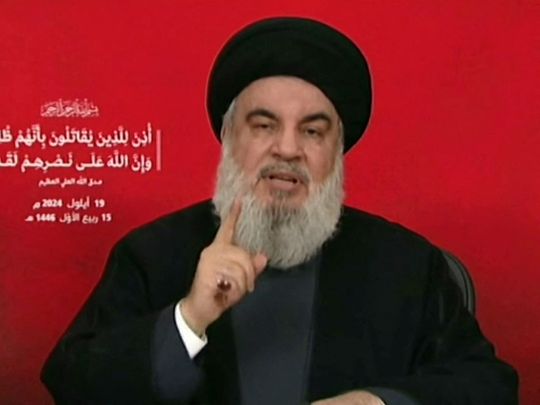
No comments:
Post a Comment